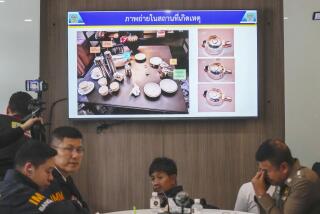Thai Rebels at Mosque Knew Their Fate, Witnesses Say
- Share via
PATTANI, Thailand — The smell of blood hung over the Krue Se mosque Thursday. Its historic brick walls were marred by hundreds of bullet holes. Its marble floors were gouged where rocket-propelled grenades exploded. A torn, bloodstained Koran lay salvaged in the courtyard.
Here, 32 Muslim rebels chose to die Wednesday in a hail of lead and shrapnel rather than surrender to police. A day later, thousands came to view the gruesome scene. To many, the dead were heroes.
“If they wanted to escape, they could have easily,” said Anek Wannailao, a regular worshiper at the mosque. “But they wanted to come here and create history.”
The men were among 108 Islamic militants who died after attacking a dozen police stations and checkpoints in southern Thailand in an attempt to steal firearms. Many of the rebels were armed only with machetes. Five police officers and soldiers also died.
The security forces, which had been alerted in advance to the planned simultaneous dawn assaults, gunned down many of the rebels as they attacked. Facing certain defeat, the 32 fighters retreated to the 16th century mosque, one of the holiest Islamic sites in Thailand.
Shooing others out of the building, the rebels took over the loudspeaker used for the call to prayer and urged fellow Muslims to join them in devoting their lives to God, witnesses said.
“They said they were willing to sacrifice their life for their religion,” recounted Somprasong Tipyorea, a neighbor who had watched the scene unfold. “They were given a chance to surrender, but the group was ready to die. They wanted to go to heaven.”
In Islam, committing suicide is a sin. But dying in defense of the religion can earn a Muslim eternity in paradise.
“Dying like this is good dying,” explained Tipyorea, who never met any of the men. “As a Muslim, I’m proud of these guys. Nobody here had seen people die with dignity like that.”
Until this week, the rebels’ frequent military successes in the south had kept them from having to make such a gesture. Since launching a series of attacks in January, the militants have killed more than 60 police officers and officials and torched dozens of schools and other public buildings, while suffering few casualties.
The militants have broad support from Thailand’s 3 million Muslims, many of whom believe that they are treated unfairly by the government. The rebels’ aim is to win independence from Thailand for the predominantly Muslim region that borders Malaysia, authorities said.
The shadowy rebel group has thousands of members, authorities said, and is led by militant Muslims who have fled to Saudi Arabia and Sweden, where they direct the military campaign by e-mail.
The rebels are organized in cells of about 18 members and seldom know members of other cells, officials said. Most of Wednesday’s attackers were initially said to be teenagers, but Interior Minister Phokin Phalakun said Thursday that most were adults.
One official said a cell that was wiped out when it attacked a police post had formed a soccer team in its village in Songkhla province.
The rebels who took over the Krue Se mosque came from a distant village and were strangers to the mosque’s regular worshipers. The fighters apparently chose Krue Se to make their stand because the mosque is among the nation’s oldest.
Neighbors who witnessed the scene Wednesday said it took soldiers an hour to arrive, but none of the rebels fled.
Police and soldiers surrounded the building and called on the militants to surrender. Most of the fighters were lightly armed, but authorities were not eager to storm the building and the standoff lasted for hours. Police later fired tear gas into the mosque, but the rebels refused to come out.
By early afternoon, the authorities ran out of patience. They fired hundreds of rounds into the building. Two rebels were killed behind the mosque. A third was killed in the covered corridor. Others might have been hit through the windows.
Finally, security forces fired grenades into the building. In the close quarters of the mosque’s main room, the militants had no chance. By some accounts, the authorities waited two hours before storming the building. None of the rebels survived.
“It was very scary,” said Niroosaree Loona, who lives nearby and watched the assault. “I thought the mosque was going to collapse. I feel very sorry for what happened because deep down we are all Muslims.”
Some have questioned whether the government was heavy-handed in repulsing the rebel attack. The number of arrestees -- 17 -- contrasted with the rebel death toll. Of those held, 10 have been released because police found that they had nothing to do with the attacks.
But Phokin, the interior minister, said police and soldiers had no choice but to defend themselves vigorously, especially given the casualties they suffered in recent months.
Nevertheless, he said, the government does not count Wednesday’s battle -- and the heavy toll on rebels -- as a major success in the war on terrorism.
“We don’t consider it a victory,” he said. “How can you consider it a victory when it is against your own people?”
More to Read
Sign up for Essential California
The most important California stories and recommendations in your inbox every morning.
You may occasionally receive promotional content from the Los Angeles Times.










